
Tree planting projects seem like a great climate solution—lots of trees can sequester lots of carbon that would otherwise be warming the atmosphere. But, surprise surprise, it turns out you can’t just plop any old tree into the ground and expect to reap environmental benefits, new research finds.
In a study published in Trends in Ecology & Evolution, a team of researchers from the University of Oxford analyzed the impact of commercial tree plantations. These projects are often created to take carbon out of the atmosphere, but these artificial forests can do just as much harm as good, the study found.
Advertisement
“The commodification of carbon and the substantial growth of the voluntary carbon market, has resulted in a boom in the number of commercial tree plantation projects across tropical ecosystems,” the authors wrote. “In practice, these offsetting projects most commonly take the form of increasing aboveground carbon, via woody biomass.”
Advertisement
The researchers analyzed literature from various studies on the growing trend of tree plantations for carbon capture. They saw that some tree plantations did reforest land. But in many cases, these projects actually do something called afforestation. This is where previously un-forested regions, like grasslands, are transformed into forests. This may sequester some carbon, but it hurts native wildlife that are not adapted for forest ecosystems. “In the Brazilian Cerrado (savanna) a 40% increase in woody cover resulted in a ~30% reduction in the diversity of plants and ants,” the study authors wrote.
Advertisement
These projects often use a limited species of trees—typically mahogany, cedar, silk oak, teak, and black wattle. The research team explained that tropical ecosystems are highly biodiverse and will be hurt by the limited number of tree species used for reforestation projects.
Jesús Aguirre-Gutiérrez, a lead author of the study and a researcher at the Environmental Change Institute at the University of Oxford, argues that companies and organizations investing in tree planting projects need to have a holistic approach that supports native plant and animal species. He pointed out that many grasslands are already natural carbon sinks that should be protected in their natural state.
Advertisement
“Why don’t we push to actually reforest the areas that have been impacted and conserve these natural ecosystems, these forests that we already have,” he told Earther. “This would be much more suitable to actually achieve our goals of carbon capture.”
And planting trees isn’t the only solution in our toolbox for mitigating the worst of the climate crisis. In the study, the researchers outlined how trees aren’t even the most effective way to stop global warming. “If all the land area within the tropics was covered by tree plantations, we would only sequester ~1.7 years of emissions,” they wrote.
Advertisement
Instead, we should divest from fossil fuel infrastructure and push world leaders to hold polluting industries accountable. A recent report from the International Energy Agency outlined how clean energy investments showed the most promise for averting the worst of climate change. “Removing carbon from the atmosphere is very costly. We must do everything possible to stop putting it there in the first place,” IEA Executive Director Fatih Birol said in a statement.
Want more climate and environment stories? Check out Earther’s guides to decarbonizing your home, divesting from fossil fuels, packing a disaster go bag, and overcoming climate dread. And don’t miss our coverage of the latest IEA report on clean energy, the future of carbon dioxide removal, and the invasive plants you should rip to shreds.
Services Marketplace – Listings, Bookings & Reviews